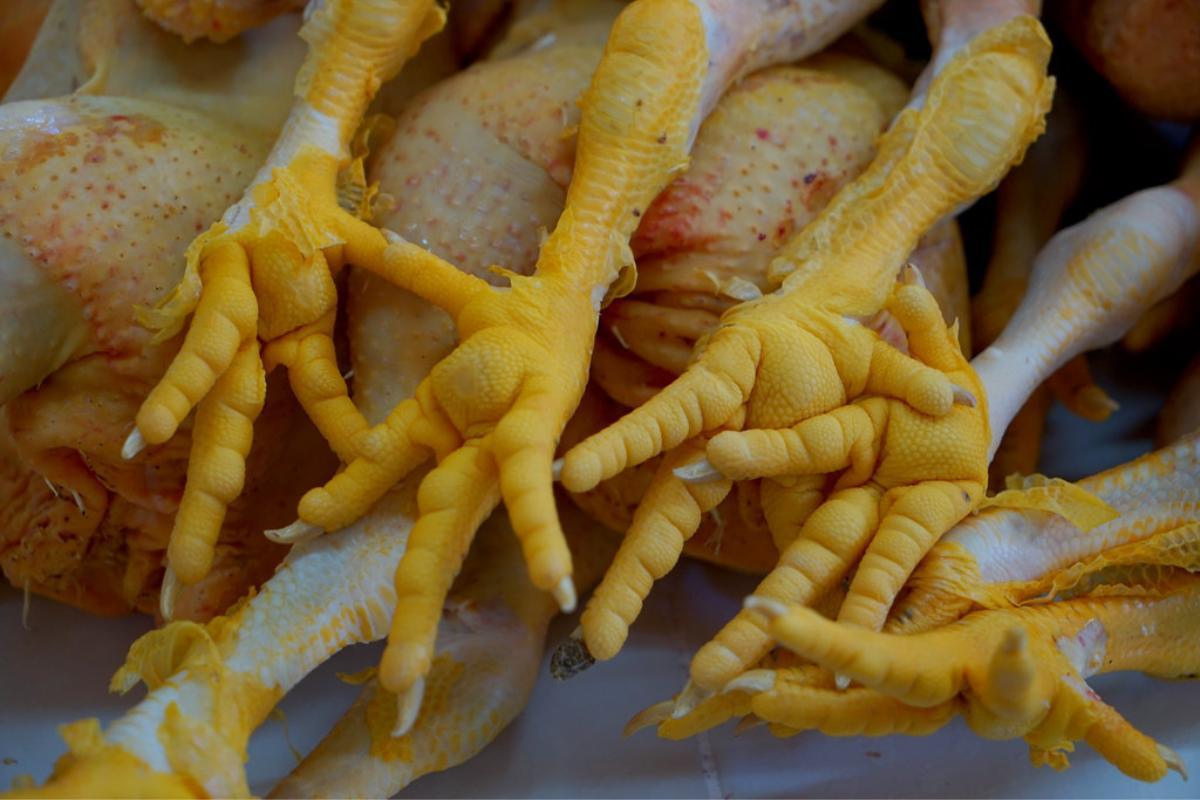Are Chicken Feet Good for Cats?



See files for Cats
Chicken feet have become a popular addition to pet diets, especially for cats. Feeding your cat unconventional snacks like chicken feet might sound odd, but these treats are packed with collagen, glucosamine, and other beneficial compounds. However, while they might offer potential benefits, it's important to consider the risks. If you're considering chicken feet as a treat for your cat, it’s essential to weigh the pros and cons.
AnimalWised examines the pros and cons of feeding chicken feet to cats. The article covers potential nutritional benefits, safe feeding guidelines, and important considerations.
Can Cats Eat Chicken Feet?
Chicken feet can be a nutritious addition to a cat's diet when given safely and in moderation. Since cats are obligate carnivores, they rely on animal-based foods, making chicken feet a potentially suitable option. In the wild, cats often consume whole prey, including bones, fur, and feathers, so they naturally adapt to digesting parts like chicken feet.
Are chicken feet safe for cats?
Chicken feet are generally safe for cats as long as they are prepared properly. They are rich in glucosamine and chondroitin, which support joint health, and contain calcium and collagen, both beneficial for bones and skin. However, safety depends on how they’re served:
- Raw chicken feet: many veterinarians support feeding raw chicken feet to cats, as raw bones are softer and less likely to splinter compared to cooked bones. Cats eating raw chicken feet should be supervised to ensure they chew them thoroughly. However, always source high-quality, fresh chicken and handle it with care to avoid the risk of bacterial contamination, such as salmonella.
- Cooked chicken feet: cooked bones, including chicken feet, are not recommended for cats. Cooking changes the structure of bones, making them brittle and prone to splintering, which can cause choking or internal injuries. If you want to offer chicken feet, raw is a safer choice.
Did you know a raw food diet could have major benefits for your cat’s health? Learn more about it in our next article.
Nutritional benefits of chicken feet for cats
Chicken feet can be a healthy cat treat with various benefits. They’re mostly made up of bones, cartilage, tendons, and skin, offering a natural source of protein and other nutrients that can support your cat’s overall health.
Key nutrients in chicken feet for cats include:
- Protein and collagen: chicken feet provide protein, including collagen, which is good for muscles and tissues. Collagen supports joint flexibility, skin elasticity, and a healthy coat. However, if your cat has kidney issues or needs a controlled protein diet, limit treats like chicken feet.
- Glucosamine and chondroitin: chicken feet contain glucosamine and chondroitin, which support joint health. These compounds can reduce joint discomfort and improve mobility, especially in older cats or those with arthritis. Cats in growth stages may also benefit from these for healthy bone development.
- Minerals and vitamins: chicken feet have calcium, phosphorus, zinc, and B vitamins. Calcium and phosphorus strengthen bones and teeth. Zinc helps with immune function, and B vitamins aid energy and metabolism. Chicken feet are also low in fat, so they can suit cats that need to manage their weight.
Wondering what the best food options for your cat are? We’ve got the full breakdown in our next article.

How to feed chicken feet to cats
Once you know that chicken feet can be part of your cat's diet, the next step is deciding how to offer them. You can choose to give them raw, cook them, or dehydrate them. Each method has its pros and cons.
Raw chicken feet
Feeding raw chicken feet is common, especially for those on the BARF (Biologically Appropriate Raw Food) diet. However, raw food can carry risks, such as the potential for parasites or bacteria. Freezing chicken feet before serving can reduce some of these risks, but it doesn’t eliminate them completely. Be aware of the possible dangers, and consult your vet before choosing this option.
Cooked chicken feet
Cooking chicken feet can reduce nutrient levels, but it also makes some nutrients more digestible. Cats have become accustomed to eating cooked food due to domestication, but cooking can cause bones to splinter. Splintered bones can damage your cat's digestive system or lead to choking. To avoid this risk, consider crushing or incorporating cooked chicken feet into a recipe.
Dehydrated chicken feet
Dehydrated chicken feet are another option. The drying process uses heat to remove moisture, which destroys potential pathogens and preserves nutrients. It’s an option many cat owners choose, as it’s convenient and safe. While you can dehydrate chicken feet at home using an oven, it takes hours, so buying pre-dried chicken feet is often easier. Keep in mind, the crunchy texture might not appeal to all cats.
Chicken eet portion for cats
If you’re adding chicken feet to your cat's diet, moderation is key. Start with one foot, or half for smaller cats, and observe how they handle it.
As a treat, chicken feet can be fed once or twice a week. If you’re using them as part of your cat’s diet, consult with a feline nutrition expert to determine the right quantity and frequency for your cat’s specific needs.

Side effects and contraindications of chicken feet for cats
Raw chicken feet can pose a choking hazard if not properly chewed. Bones can splinter or break, leading to injury or blockages in the digestive system. This is why it's important to supervise your cat while they eat or consider crushing or cutting the feet into smaller pieces.
Chicken feet are rich in protein, which may not be suitable for cats with certain health conditions like kidney disease. Cats with kidney problems need to have their protein intake carefully controlled.
While chicken feet are relatively low in fat, overfeeding them could contribute to an excess of fat in your cat’s diet. Cats that need to manage their weight or have sensitive stomachs may not tolerate fatty treats well.
And finally, as with any new food, there’s always a chance your cat could be allergic to chicken feet, especially if they have a history of food sensitivities. Look for signs of allergic reactions such as vomiting, diarrhea, or skin irritations.
Curious about how to care for a cat with kidney stones? We’ve got more tips and advice for you in our next article.
If you want to read similar articles to Are Chicken Feet Good for Cats?, we recommend you visit our Homemade diets category.







